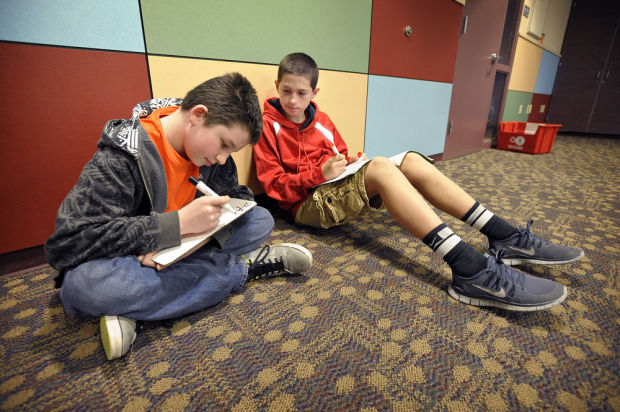Pauling Pride Blog
Tuesday, April 1, 2014
Great News for the Pauling Pride Garden!
Tuesday, February 4, 2014
Linus Pauling Begins Peer Mentoring Program
Linus Pauling begins peer mentoring program

LPMS tech in district news!
January 6, 2014
For our January 1:World Newsletter we are thrilled to spotlight Linus Pauling Middle School. Middle school students received iPad2s for student classroom use, which are also available to take home. As a reminder, more information is also available on the district website: http://www.csd509j.net/en-us/districtinformation/keyinitiatives/1world.aspx.
Eric Beasley, Principal:
Technology integration continues to move forward at LPMS. I enjoyed hearing from teachers about the ways they are enhancing learning with iPads after attending professional development sessions. While walking through the hall recently, I visited with a group of students actively engaged in a science project with their iPads. The students researched the layers of the earth and were preparing a video presentation to articulate what they learned. A great strategy to become proficient about a topic is to teach the concept to someone else. The process of teaching to others allows the students the opportunity to plan, think and act on what you learned which really drives it home. Accessing information and presenting are just a few of the positive examples I have seen the iPads utilized.
Suzanne McFarland-Price, Language Arts Teacher:
As a language teacher, I was excited to introduce the iPads into my classroom. I have used them to do many of the same activities we used to do, in addition to some new activities. My students use their iPads as white boards to write, draw and share answers in class. They have created graphic organizers and three paragraph essays with the application Pages.  Students were able to easily add images to their essays as well. An added feature with the iPads is that the essays are completed without me ever handing out a single paper and without them handing in a single paper. I posted an assignment on Showbie, they sent it to me the same way and every student handed in the assignment!
Students were able to easily add images to their essays as well. An added feature with the iPads is that the essays are completed without me ever handing out a single paper and without them handing in a single paper. I posted an assignment on Showbie, they sent it to me the same way and every student handed in the assignment!
Learning vocabulary is an important part of my curriculum. Students now use the iPads to create their vocabulary pages; each word gets its own page where students use an application like Notability to draw an image of the word, define the word and write a sentence. The iPad allows students to now record themselves saying the new words and reading the sentences they created with these words. In addition to recording single words and sentences, my students are recording 30-second responses to prompts as a warm up at the beginning of each class. Students use Showbie to add a voice note for me that I can listen to at another time. I choose random students to share their recordings every day with the entire class. Recently my 8th graders have been exploring new territory with the iPads by creating a movie trailer for the novel we read, Una Mano en la arena. Screening of the trailers took place right before winter break. I think the iPads can be used to teach traditional lessons and to create new and innovative lessons in my classroom.
Christy Toliver, Math Teacher:
The iPads have become great learning tools in my classroom. In my math classes, students use them to access, manipulate, and return various assignments. While this use has saved copies and instructional time passing papers, the most satisfying difference I have noticed is an increase in student participation during class. The interactive nature of the iPads motivates students to show their understandings on assignments and activities, usually in multiple colors! The greatest impact of the iPads though has happened in my Math Lab classes. Part of students' work in these classes is practicing needed math skills. These skills are naturally different for each individual student. The iPads have allowed each student to access a web-based math program where they can practice the skills that they need at their own pace. This individualized access gives each student the practice and feedback they need at the time and pace they need it. Some students have even accessed the program at home using their devices. The number of skills that students have mastered has been soaring as students work towards their own goals with the iPads.
Corvallis School District started phase II of the 1:World initiative this year, which is about implementing the most effective instructional tools to connect students to their own learning. The emphasis is on content, challenge-based learning and effective tools to facilitate a pedagogical shift in the classroom. It’s not about the device. The goals of 1:World are to close the opportunity gap, focus on and emphasize 21st century learning skills, create personalized student learning opportunities before, during and after school, connect students to the world and make every student a graduate.
This year iPads were distributed to classroom at Mountain View Elementary School, Linus Pauling and Cheldelin Middle School, Corvallis and Crescent Valley High School AVID students, and English-only students at Garfield and Lincoln Elementary School. The district hopes to have full implementation across all schools (Phase III) within the next few years.



